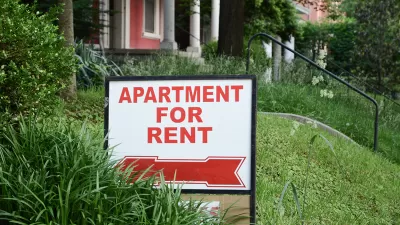Most communities lack a way of collecting real-time data on whether landlords are complying with rules. A rental registry could change that.

Being a landlord is a unique line of work. In few sectors can someone assume so much responsibility with so little training.
In most cases, a downpayment and a good credit score is all it takes to buy and begin managing a rental property, the place where tenants eat, sleep, play, raise their children, and—increasingly—work. Because the bar to entry is so low, many landlords are unaware of their responsibilities, or they are actively malicious and exploitative; they may increase rents beyond legal limits or make unenforceable eviction threats, for example, and they often get away with it because tenants typically know even less about their rights. Most decisions that landlords make about their tenants’ housing situations are never approved, reviewed, or even witnessed by an outside party. It’s a system designed for abuse.
As renters face illness and job loss due to the COVID-19 pandemic, a confusing patchwork of state and local eviction protections is the only thing staving off homelessness for hundreds of thousands, perhaps millions, of vulnerable households. Despite the importance of these protections, public officials lack real-time data to know whether landlords are complying with the rules or flouting them—not just for recent eviction protections, but also pre-existing regulations like building code requirements and rent control.
As a result, enforcement is spotty at best. A National Housing Law Project survey found that 91 percent of legal aid and civil rights attorneys reported that they have witnessed illegal evictions in their area. The solution to this problem is a rental registry, a simple online tool to track basic information about rental housing and the treatment of tenants. With minimal cost and hassle, rental registries can add much-needed transparency to the landlord-tenant relationship, keeping landlords accountable and helping renters stay safe and stable in their homes.
Rental registries already exist in cities across the country, including Raleigh, Seattle, Minneapolis, eight cities in California, and at least 20 in Texas. The costs on the city’s end are modest. San Francisco recently estimated a $300,000 startup cost with annual costs of around $1.7 million to $3.6 million per year. Most existing registries were created only to support code enforcement activities, but a simple set of requirements could allow them to do much more.
For instance ...
FULL STORY: We Need Rental Registries Now More Than Ever

Planetizen Federal Action Tracker
A weekly monitor of how Trump’s orders and actions are impacting planners and planning in America.

Maui's Vacation Rental Debate Turns Ugly
Verbal attacks, misinformation campaigns and fistfights plague a high-stakes debate to convert thousands of vacation rentals into long-term housing.

San Francisco Suspends Traffic Calming Amidst Record Deaths
Citing “a challenging fiscal landscape,” the city will cease the program on the heels of 42 traffic deaths, including 24 pedestrians.

Defunct Pittsburgh Power Plant to Become Residential Tower
A decommissioned steam heat plant will be redeveloped into almost 100 affordable housing units.

Trump Prompts Restructuring of Transportation Research Board in “Unprecedented Overreach”
The TRB has eliminated more than half of its committees including those focused on climate, equity, and cities.

Amtrak Rolls Out New Orleans to Alabama “Mardi Gras” Train
The new service will operate morning and evening departures between Mobile and New Orleans.
Urban Design for Planners 1: Software Tools
This six-course series explores essential urban design concepts using open source software and equips planners with the tools they need to participate fully in the urban design process.
Planning for Universal Design
Learn the tools for implementing Universal Design in planning regulations.
Heyer Gruel & Associates PA
JM Goldson LLC
Custer County Colorado
City of Camden Redevelopment Agency
City of Astoria
Transportation Research & Education Center (TREC) at Portland State University
Jefferson Parish Government
Camden Redevelopment Agency
City of Claremont





























